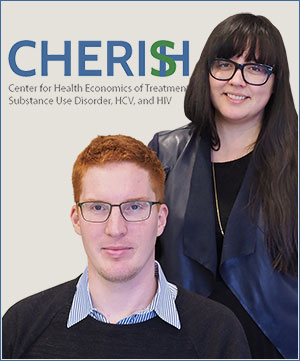Substance Use Disorder
News
From C-Section and Knee Arthroscopy to Opioid Dependency: How Big A Problem?
A Penn Postdoc's Research Pilot Project Seeks to Answer That Question
Is it possible that the widespread prescribing of excessive amounts of opioids for C-section and knee arthroscopy patients is responsible for producing a significant number of opioid dependencies?
That question is the subject of Perelman School of Medicine Injury Science Center postdoctoral researcher Benjamin Ukert‘s new pilot project funded by the Center for Health Economics of Treatment Interventions for Substance Use Disorder, HCV, and HIV (CHERISH).

Benjamin Ukert, PhD, of Penn and Czarina Behrends, PhD, of Weill Cornell, have won CHERISH pilot grants.
Launched in 2015 and funded by the National Institute on Drug Abuse, CHERISH is a collaborative effort of Penn LDI, Weill Cornell Medical College, Boston Medical Center and the University of Miami Medical School. Its researchers are involved in a broad range of studies related to opioids, HIV/AIDS and HCV.
Early stage funding
In some of its previous pilot grants, CHERISH has funded early-stage work that analyzed how HCV treatment can be more effectively integrated into primary care; how state prescription drug monitoring programs (PDMPs) impact prescribing levels; the variability and excesses of opioid prescribing practices for six specific diagnoses; and the impact of e-cigarette and marijuana policies on cigarette use and birth outcomes.
Supported by his new CHERISH pilot grant, Ukert, PhD, an Associate Fellow at Penn’s Leonard Davis Institute of Health Economics (LDI) and a Penn Injury Science Center postdoctoral researcher is analyzing private insurance patient data from 2012 to 2015 to find opioid prescriptions given to surgical patients who have no previous history with opioids. Then, he is tracking their prescriptions over the next year to see how many patients were subsequently given a second and third refill in a period when many physicians routinely prescribed 30 or 40 pills at a time.
Critical quantity of pills
“Current medical guidelines say that if you get more than 20 pills the first time, there’s a higher risk of becoming addicted,” said Ukert at a day-long CHERISH research dissemination and policy mentoring session at LDI. He hopes to quantify if, in fact, that has happened to any significant degree in two areas of surgery that normally do not involve long-term pain management.
Ukert was one of two recent recipients of CHERISH pilot project grants. The second was Czarina Behrends, PhD, an instructor at Weill Cornell Medical College whose research focuses on harm reduction strategies, program evaluation and research related to HIV and Hepatitis C testing and care, with a special focus on people who inject drugs.
Expanding Naloxone distribution
Funded by her new CHERISH grant, Behrends is working with the New York City Department of Health to assess citywide Naloxone (Narcan) distribution patterns, outcomes, and requirements for new resources. She is currently interviewing managers at homeless shelters, substance abuse programs, emergency departments and other settings that have an ongoing association with opioid users. As New York shifts more funding into its Naloxone program it needs to know how to best expand it. Behrends’ findings will help to map out new distribution points for the overdose-reversing drug and identify barriers that may impede its broader availability.
“So far,” said Behrends, “the barriers seem different for different types of organizations. The larger ones face challenges in managing their Naloxone supply because when they order from New York City, the Naloxone is shipped to a single place and they have to redistribute it to elsewhere in the city, which is really complicated. Smaller programs have more trouble keeping up with community demand for Naloxone training. They try the best they can, but money is an issue.”
“Overall,” Behrends continued, “the administrative red tape around how Naloxone is distributed is challenging and that is the basis of the question for us: how to get it to the people who need it most?”